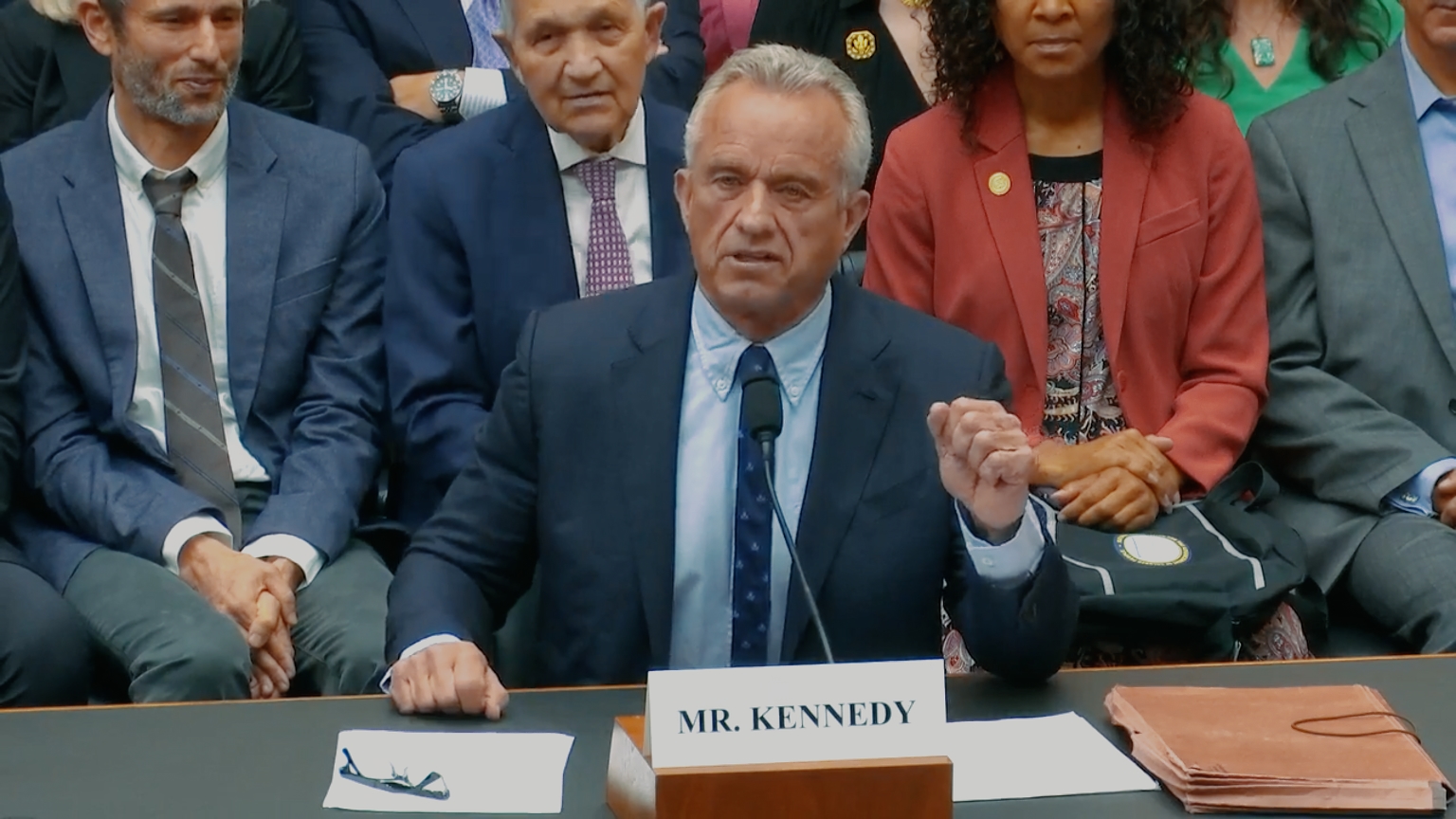During a House Judiciary Select Subcommittee hearing on the Weaponization of the Federal Government that aimed to examine the federal government’s role in censoring Americans, Democrats voted to censor presidential candidate Robert F. Kennedy Jr after he responded to attacks from Rep. Stacey Plaskett (D-VI).
In her opening statement, Plaskett questioned why Republicans were holding the hearing and took aim at Kennedy. She accused Kennedy of using “hyper, superhuman, sub-human kind of language” when discussing vaccines and immunity and implied that his free speech shouldn’t be protected.
“Free speech is not an absolute,” Plaskett said. “The Supreme Court has stated that.”
Plaskett continued by claiming that the investigating Big Tech-government censorship collusion is an attempt to “bully tech and media companies into turning a blind eye to right-wing extremist conspiracies.”
Kennedy used his opening statement time to highlight the importance of the First Amendment and pointed to a letter that over 100 people had signed in an attempt to get him uninvited from the hearing as evidence of “the problem the hearing was attempting to address.
“This is an attempt to censor a censorship hearing,” Kennedy said.
Kennedy noted that he’d personally been subject to Big Tech censorship numerous times and added that since announcing his presidential run, he’d also been “subject to a new form of censorship which is called targeted propaganda.”
He continued by saying that pejoratives such as “anti-vax,” “anti-semitism,” and “racism” have been to him in order to censor him.
“These are the most appalling, disgusting pejoratives, and they’re applied to me to silence me because people don’t want me to have that conversation about the war, about groceries, about inflation, about the war on the middle class in this country that we need to be having,” Kennedy said.
In a startling move, Rep. Debbie Wasserman Schultz (D-FL) responded to Kennedy’s pro-free speech comments by pushing to censor him via a motion.
This motion went to a vote and Democrats then voted to censor Kennedy during this hearing where he had been invited to speak on censorship.
Later in the hearing, Plaskett questioned “the extent of censorship” because one of Kennedy’s social media posts hadn’t been taken down and continued to complain about Kennedy being allowed to speak.
Rep. Thomas Massie (R-KY) blasted the Democrats for “denying that censorship is occurring but suggesting that there’s more material needs to be censored.” He also called them out for attempting to silence Kennedy during a censorship hearing. Massie then asked Kennedy to speak about his experiences with censorship.
Kennedy responded to Plaskett’s attacks on him by saying “every statement you have just made about me is inaccurate” and clarifying his views.
He then told Massie that the term “malinformation” was being used to censor information that Big Tech “understood was true but that the White House and other federal agencies wanted censored anyway for political reasons because it challenged political orthodoxies”
Kennedy continued by describing how his Instagram account was censored after he was added to the infamous “Disinformation Dozen” list. This list was compiled by the Center for Countering Digital Hate, a non-profit that “counters the spread of online hate and disinformation,” heavily amplified by the media, and used to pressure tech companies to censor the 12 people on the list. Facebook rejected the premise of this Disinformation Dozen list but censored the individuals anyway.
When it was her turn to question Kennedy, Wasserman Schultz again attempted to censor him by asking Chairman Rep. Jim Jordan (R-OH) to disinvite Kennedy and cutting Kennedy off when he attempted to respond to her attacks on him.
Rep. Gerry Connolly claimed that former director of the National Institute of Allergy and Infectious Diseases (NIAID) Dr. Anthony Fauci, whose views were heavily amplified by Big Tech and the legacy media during Covid, had been censored. He also described the hearing as an “Orwellian dystopia” and defended the “protective measures…to take down disinformation about vaccines and about the nature of the virus and…masks.”
Rep. Mike Johnson (R-LA) called out the Democrats and accused them of trying to “bully and defame our witnesses and try to cover up their opinions.”
He added: “They actually began the hearing with a motion to prevent them from testifying. You can’t make this stuff up.”
Johnson then asked D. John Sauer, the Special Assistant Attorney General at the Louisiana Department of Justice, to discuss some of the examples of the government pressuring tech companies to censor that were uncovered as part of the Missouri v. Biden lawsuit.
Rep. Kat Cammack (R-FL) asked the witnesses about the ramifications of the federal government’s censorship pressure on the public. They responded by explaining how citizens have the right to speak freely in the United States and that if this right is infringed upon, the censorship will continue to expand.
You can watch the full hearing and get the witnesses’ written opening statements here.














